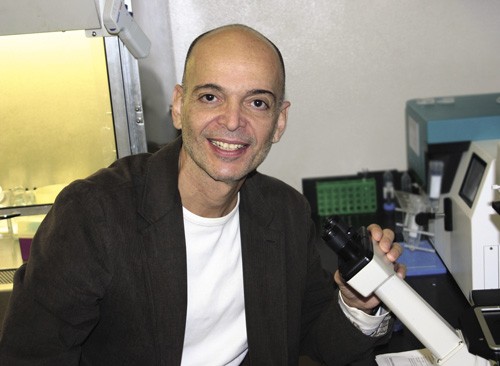After 13 years of research, a cancer vaccine developed at the UA Steele Children’s Research Center will finally be used in human clinical trials.
Dr. Emmanuel Katsanis, professor of pediatrics in the UA College of Medicine, began research for the vaccine, which will help keep cancer in remission, when he came to the UA in 1997. Katsanis is an oncologist and holds the Louise Thomas Chair in Pediatric Cancer Research.
Colin Easom, the founder of Runway for Research, is excited for the upcoming trials. Katsanis treated Easom’s daughter after she was diagnosed with a rare form of cancer several years ago.
Though their daughter is doing well, Easom and his wife were motivated to help other children. Easom started an annual fashion show featuring pediatric cancer patients and their siblings. All of the profits are donated to Katsanis’ research.
“”It is very exciting to see a research project that is highly successful,”” Easom said. “”We helped fund that project, and hopefully that will save lives.””
Katsanis agrees that the vaccine may be able to help children with cancer.
“”I’d like to see it applied wherever it’s effective, but especially with kids who we can’t cure through other means,”” Katsanis said.
With a team of eight, Katsanis leads research in tumor immunotherapy. The field focuses on treating cancer by utilizing the human immune system.
This research has led to the development of a cancer vaccine called chaperone-rich cell lysate.
Unlike a typical measles or flu vaccine, the CRCL vaccine will not be given to people to prevent cancer.
“”It’s more of a therapeutic vaccine,”” Katsanis said.
After being diagnosed with cancer, patients normally receive chemotherapy. The treatment is effective in killing most cancer cells, and the disease often goes into remission.
“”At this stage, the cancer is rarely detectable anymore,”” said Nicolas Larmonier, a research associate professor in pediatrics at the Steele Children’s Research Center.
But even after chemotherapy, some cancer cells remain in the body. When these cancer cells return, they are more resistant to treatment.
The goal of the CRCL vaccine is to “”educate the immune system,”” Katsanis said. The vaccine stimulates the immune system to recognize and remove cancer cells.
A small, immunotherapy-based company bought the rights to this UA-patented vaccine about two years ago. The company will soon begin clinical trials in Israel and Europe on patients with blood cancers.
The vaccine will be customized for each patient. Before receiving chemotherapy, a sample of the patient’s tumor will be used to create the vaccine. After treatment, the vaccine will help keep the cancer in remission.
If successful, the vaccine can be used to treat most types of cancer.
“”The idea is that it can be prepared from every tumor,”” Katsanis said.
Though the vaccine showed promising results after it was tested on mice, these trials mark its first application for humans.
“”It is a very exciting time for us, moving to human clinical trials,”” Larmonier said.
Katsanis estimates that the research has cost millions of dollars over the past 13 years. Katsanis has received grants from the National Cancer Institute, the American Cancer Society, the Department of Defense and the Leukemia and Lymphoma Society, as well as donations from local charities Tee Up for Tots and Raise a Racquet for Kids.









